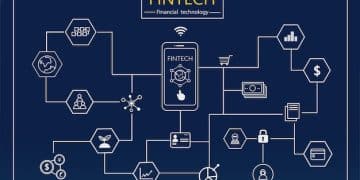Fintech’s Long-Term Impact: Work and Financial Inclusion in the US

Fintech’s long-term implications on the future of work and financial inclusion in the US involve reshaping job roles, promoting accessibility to financial services, and presenting challenges related to data security and regulatory adaptation, demanding a balanced approach to innovation and risk management.
The rise of financial technology, or fintech, is rapidly transforming various aspects of our lives. But, what exactly are the long-term implications of fintech on the future of work and financial inclusion in the US? Let’s delve in.
Understanding the Fintech Revolution
Fintech has emerged as a disruptive force in the financial services industry. It is more than just a buzzword; it represents a fundamental shift in how financial services are delivered and consumed.
What is Fintech?
Fintech encompasses any technological innovation in the financial sector. This includes mobile banking apps, cryptocurrency platforms, and automated investment tools.
Key Drivers of Fintech Growth
Several factors contribute to fintech’s rapid growth, including increasing smartphone penetration, the demand for more convenient financial services, and the need for financial inclusion.
- Digital Transformation: Businesses are rapidly adopting digital technologies.
- Changing Consumer Expectations: Customers desire seamless, personalized experiences.
- Regulatory Support: Governments are creating regulatory frameworks to foster innovation.
- Investment Influx: Venture capital and private equity firms are pouring resources into fintech startups.
In essence, fintech is revolutionizing how individuals and businesses manage their finances, creating both opportunities and challenges.
Impact on the Future of Work
The fintech revolution is not only changing the financial landscape but also reshaping the future of work. Automation, new skill requirements, and evolving employment models are all part of this transformation.

Automation and Job Displacement
One of the most significant concerns is the potential for automation to displace human workers. Fintech applications can automate tasks that were previously performed by employees.
New Skill Requirements
While some jobs may be automated, fintech also creates new job opportunities. These roles require skills in data analytics, cybersecurity, and software development.
- Data Science: Analyzing large datasets to inform financial decisions.
- Cybersecurity: Protecting financial systems from cyber threats.
- Software Development: Creating and maintaining fintech applications.
Therefore, the future of work in the financial sector will require continuous learning and adaptation.
Enhancing Financial Inclusion
One of the most promising aspects of fintech is its potential to enhance financial inclusion. By leveraging technology, services can be extended to underserved populations.
Reaching the Unbanked
Traditional banking institutions often overlook individuals and communities with low incomes or remote locations. Fintech solutions can bridge this gap.
Mobile Banking and Digital Payments
Mobile banking apps and digital payment platforms make financial services accessible to those with smartphones but limited access to physical bank branches.

- Lower Transaction Costs: Reducing the financial burden for low-income users.
- Simplified Processes: Easy-to-use interfaces for non-technical users.
- Increased Transparency: Providing clear and accessible information.
Financial inclusion can empower individuals, stimulate economic growth, and reduce inequality.
Challenges and Risks
While the fintech revolution offers numerous benefits, it also presents significant challenges and risks. These include regulatory issues, cybersecurity threats, and ethical considerations.
Regulatory Uncertainty
The rapidly evolving nature of fintech often outpaces existing regulations. This can create uncertainty for businesses and consumers alike.
Cybersecurity Threats
The increased reliance on digital platforms makes the financial sector more vulnerable to cyberattacks. Data breaches and fraud can erode trust in fintech services.
- Data Protection: Implementing robust security measures to safeguard sensitive information.
- Fraud Prevention: Developing advanced fraud detection systems.
- Compliance: Adhering to regulatory standards for data security.
Addressing these challenges is crucial for the sustainable growth of the fintech industry.
Policy and Regulatory Responses
Governments and regulatory bodies play a critical role in shaping the future of fintech. Policies must strike a balance between fostering innovation and mitigating risks.
Creating Regulatory Sandboxes
Regulatory sandboxes allow fintech companies to test new products and services in a controlled environment. This can accelerate innovation while minimizing the risk of consumer harm.
Promoting Data Privacy
Stringent data privacy regulations are essential to protect consumers’ personal and financial information. Compliance with these regulations can build trust in fintech services.
- Data Governance: Establishing clear policies for data collection, storage, and use.
- Consumer Consent: Ensuring that consumers have control over their data.
- Transparency: Providing clear information about data practices.
Effective policy and regulatory responses are key to harnessing the benefits of fintech while managing its potential risks.
Future Trends in Fintech
The fintech landscape is constantly evolving, with new technologies and trends emerging. Understanding these trends is essential for businesses and policymakers alike.
Blockchain Technology
Blockchain has the potential to revolutionize financial transactions by providing a secure and transparent ledger. It is used in cryptocurrencies, supply chain management, and digital identity verification.
Artificial Intelligence (AI)
AI is transforming various aspects of fintech, from fraud detection to personalized financial advice. AI-powered chatbots can provide 24/7 customer support.
- Algorithmic Trading: Using AI to automate trading decisions.
- Personalized Banking: Tailoring financial products and services to individual needs.
- Risk Management: Leveraging AI to detect and prevent fraud.
Staying ahead of these trends will be crucial for success in the fintech industry.
| Key Point | Brief Description |
|---|---|
| 🔑 Automation | Fintech is automating jobs, requiring new skills in data and cybersecurity. |
| 📱 Financial Inclusion | Mobile banking makes financial services accessible to the unbanked. |
| 🛡️ Cybersecurity | Increased reliance on digital platforms increases vulnerability to cyber threats. |
| ⚖️ Regulation | Regulatory sandboxes help balance innovation and consumer protection. |
Frequently Asked Questions
▼
Fintech automates routine tasks, reducing the need for some traditional banking jobs. However, it also creates new roles in areas like data analysis and cybersecurity, requiring new skills.
▼
Fintech offers convenience, lower costs, and greater accessibility to financial services. Mobile banking and digital payments make managing finances easier, especially for those underserved by traditional banks.
▼
Governments can foster innovation by creating regulatory sandboxes, promoting data privacy, and investing in digital infrastructure. Supportive policies help fintech companies develop and deploy innovative solutions.
▼
Risks include cybersecurity threats, regulatory uncertainty, and the potential for fraud. Robust data protection measures and compliance frameworks are essential to mitigate these risks and maintain consumer trust.
▼
Fintech provides mobile banking and digital payment solutions that reach remote communities. These technologies reduce transaction costs and simplify processes, making financial services more accessible to rural populations.
Conclusion
In conclusion, fintech’s long-term implications on the future of work and financial inclusion in the US are profound. While it promises to reshape industries, enhance accessibility, and drive innovation, careful consideration must be given to the challenges and risks. A balanced approach that fosters innovation while safeguarding consumers is essential for realizing the full potential of fintech.





